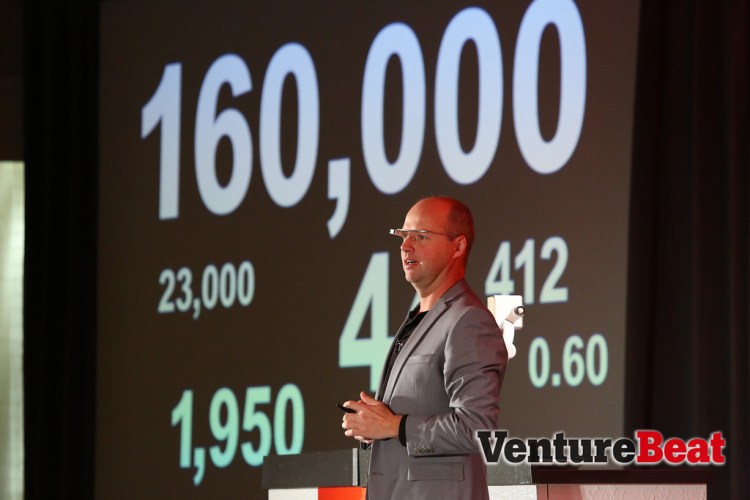REDWOOD CITY, Calif. — Data could be our best shot at breaking America out of an “educational code red.”
“Education used to be a slice of life, something you did as a child through college, and then spent the rest of your life working, and then death,” said Udacity CEO Sebastian Thrun at VentureBeat’s DataBeat/Data Summit. “Everything is about to change. I believe education will become something that fits seamlessly into life, and we will take big clunky things like degrees and college and fit them into a weekend.”
Thrun discussed how data science, and specifically Udacity, is changing higher education to make it more relevant and affordable.
Udacity is an online education portal that provides project-based courses led by college professors and industry experts. Thrun said the courses are designed to impart skills that make people employable and bridge the gap between the skills employers need and what universities teach. Many of the courses are designed by companies such as Google, Facebook, Cloudera, and MongoDB.
Thrun has had an illustrious career. He has a Ph.D in computer science and statistics and started Carnegie Mellon’s masters program in knowledge discovery, which bridges the statistics and computer science departments. This program evolved into America’s first Ph.D program in machine learning.
He went on to become a professor at Stanford and served as director of the Stanford Artificial Intelligence Lab, which is where he realized that the Internet could solve many of higher education’s problems.
“Two years ago, a colleague at Stanford and I decided to teach a class online,” Thrun said. “We sent out one e-mail message for an Introduction to Artificial Intelligence for free and expected it to attract 500 to 1,000 students — 160,000 students signed up. We ended up teaching more students A.I. than all the other professors in the world combined, and it cost just 16 cents per student.”
America’s higher education system is prohibitively expensive for a significant portion of the population. Student loan debt has surpassed $1 trillion in the U.S. and is continuing to rise. The average debt per student is over $27,000 – it outstrips car loans and credit card as the largest sources of personal debt.
The Pew Research Center estimates that nearly one in five households is paying off student loan debt, and it haunts many people for decades.
Alas, the burden is only getting heavier.
Tuition in the U.S. is expected to double in the next 10 years. A recent report from Goldman Sachs, based on Department of Labor Statistics, found that unemployment rates of college graduates has surpassed those of workers without a high school education.
An expensive college degree no longer guarantees a lucrative career and a quick climb out of debt, because many degrees don’t adequately prepare people for the modern workforce.
The Labor Department came out with a report suggesting that 65 percent of grade school kids will have a job that hasn’t even been invented yet. Data science as a field is about five years old, and it’s now one of the most in-demand skill sets in America.
Thrun said that technology causes the world to move so fast that learning has to be a lifelong pursuit, which is what Udacity strives to enable.
Furthermore, data can be used to make teaching more effective in a way that isn’t possible with the traditional classroom-lecture model.
“Every click, every second, every good or bad attempt to answer a question gives us a data point,” Thrun said. “If we study learning as a data science, we can reverse engineer the human brain and tailor learning techniques to maximize the chances of student success. This is the biggest revolution that could happen in education, turning it into a data-driven science, and not such a medieval set of rumors professors tend to carry on.”
Thrun said that many of his Stanford students, who were enrolled in his classroom lectures, preferred to take the class online because they could learn at their own pace.
If they were stuck on a problem online, they could try it over and over without bothering other students. If they were night people, they could listen to lectures at midnight if they chose.
Instructors also have the ability to see what is effective and what isn’t. For example, if there is a quiz that a majority of students have to take over and over, there could be something wrong with the quiz.
Udacity recently launched a corporate training initiative and a data science track to really focus on its goal of preparing people for the workforce. Thrun said it is also working with Georgia Tech, which has a top 10 computer science department, to offer its masters of science in computer science degree.
“The ‘MOOCified’ version cut tuition from $45,000 to around $6,000,” Thrun said. “If more universities do this, trillion dollar student debt will hopefully be made a thing of the past.”


